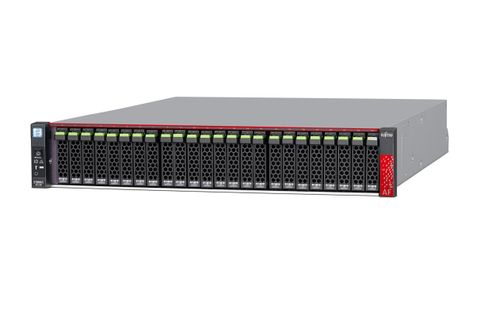IT Pro Verdict
Fujitsu’s Eternus AF250 all-flash array is great value, delivers good FC performance and its all-inclusive data protection software won’t be beaten for features
Pros
- +
Fast FC SAN performance; Low latency; Good value; Top data protection, Inline deduplication; All software licenses included in price
Cons
- -
Atrocious documentation
High performing all-flash storage has traditionally been beyond the budgets of SMEs but Fujitsu's Storage Eternus AF250 aims to put it firmly within their grasp. Along with 24 SFF drive bays, this 2U appliance sports dual controllers running in active/active mode for fully transparent failover and supports up to eight 16Gbps FC or 10GbE IP SAN data ports.
The AF250 brings even more to the table as inline deduplication and compression are included and can be set on a per-volume basis. Data protection features include support for up to 4,096 snapshots plus optional tools for volume mirroring, cloning plus remote replication and the price we've shown activates them all.
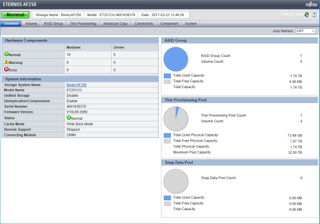
The appliance's local web interface provides an overview of storage and pool usage
Swift installation
The appliance's web interface provides a quick start wizard on first contact. This helped us configure details such as a hostname, a new administrator password, SNMP community names and license registration.
We were supplied with five 960GB Toshiba MLC SSDs and our first task was to create RAID Groups (RGs) which define a collection of drives, an array type, a total capacity and the primary controller. We opted for a high-performance RAID10 array using four SSDs but RGs also support standard striped, mirrored, RAID5 and 6 arrays.
Thinly provisioned volumes (TPVs) require a dedicated storage pool and as volume space gets used, the appliance dynamically assigns new blocks to it from the pool. These are also required for deduplication and compression as only volumes created from a thinly provisioned pool can have these enabled.
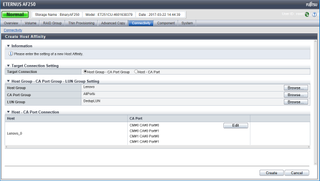
Access controls are good as affinity groups link hosts, LUNs and data ports together
Manual labours
Configuration gets more complicated from here on and this isn't helped by Fujitsu's confusing documentation. The appliance's web console manual, for example, is over 1,100 pages and looks like it was written by a committee.
After creating volumes, we set up groups for our hosts, LUNs and data ports. Multiple volumes can be assigned to LUN groups where they each get their own LUN number and hosts must be connected and discovered before they can be added to groups.
We tested using a Windows server host equipped with a 16Gbps Emulex FC card which was discovered without any problems. Once we had created all our host, port and LUN groups, we used Fujitsu's affinity groups to link them together allowing us to enforce strict access controls.
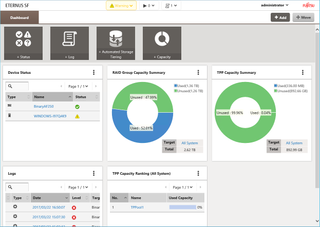
The SF Express web console is designed to manage multiple Eternus arrays
Good FC Performance
For performance testing, we mapped a volume to a Lenovo System x3550 M5 Windows server with dual E5-2650 v4 Xeons and 128GB of DDR4 memory. With Iometer configured for 256KB transfer requests, we saw top raw sequential read and write rates for a 16Gbps FC connection of 12.3Gbits/sec and 11.3Gbits/sec.
Random reads delivered the same 12.3Gbits/sec throughput while random writes improved to 12.3Gbits/sec. I/O performance is also good as with Iometer set to 4KB transfer requests, we saw 171,800 and 85,000 IOPS for sequential reads and writes.
Swapping over to random operations saw a drop in throughput for reads and writes to 152,000 and 72,000 IOPS. Response times were impressively low as our IOPS tests with 50 outstanding I/Os returned latencies of between 0.9ms and 1.5ms.
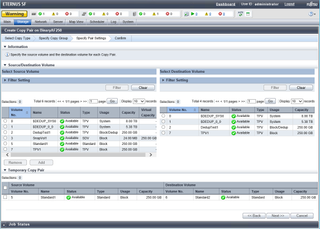
Data protection features are extensive and include volume snapshots and clones
SF Express and the rest
Fujitsu's SF Express software provides a central web console for managing multiple arrays and all snapshot, cloning and backup features. It accesses the appliance over SNMP and requires a special user created on the appliance with the Software' role assigned.
The price includes the SF Storage Cruiser upgrade which, along with enhanced performance monitoring and reporting, enables data tiering and automated QoS. Note the latter two work together and only support FTVs (flexible tier volumes). Fujitsu's thinking here is businesses can enable QoS on a single flash tier for high-performance apps while TPVs with deduplication are employed where storage savings are important.
Data protection features are excellent with the AdvancedCopy services managing all volume snapshot, cloning and copy operations. All jobs start by creating a copy pair and then choosing the operation to be performed.
OPC (one point copy) creates a one-off clone of a source volume to a local destination volume while QuickOPC clones a volume and then updates it incrementally. EC (equivalent copy) mirrors one volume to another on the same array in real-time while the REC (remote EC) performs this to a remote array for disaster recovery.
SnapOPC+ (one point copy plus) uses dedicated SDVs (snap data volumes) to take copy-on-write snapshots of selected source volumes and are ideal as temporary staging areas for offloading backups. You can also create an SDV pool so if any SDV runs out of space it can grab some from here until you increase the SDV's size.

Inline data deduplication is included and our tests saw a near 4:1 reduction ratio
Conclusion
We've had all-flash arrays in the lab that are easier to deploy than the Eternus AF250 and we recommend taking up Fujitsu's offer of installation and training services. That said, none of them can beat it for data protection features as Fujitsu's snapshot, cloning and replication tools are extensive.
All-flash performance is very good and the starting price of under 10K for our system is also comparatively good value. Along with the dual controller hardware, it includes licenses for the SF Express software, the Cruiser upgrade plus local and remote replication.
Verdict
Fujitsu’s Eternus AF250 all-flash array is great value, delivers good FC performance and its all-inclusive data protection software won’t be beaten for features
Chassis: 2U rack
Storage: 24 SFF hot-swap drive bays
Power: 2 x 805W hot-plug PSUs/fans
Dual hot-plug SAS3 controllers each with the following:
CPU: 2GHz 6-core Xeon
Memory: 16GB DDR3 cache (max 32GB)
Array support: RAID0, 1, 10, 5, 6, 50, global/dedicated hot-spare
Data ports: 16Gbps FC or 10GbE iSCSI (max 8)
Expansion: External SAS3 port (future support)
Management: Web browser
Software: Fujitsu SF Express, Cruiser Standard/QoS, AdvancedCopy Manager Local/Remote
Dave is an IT consultant and freelance journalist specialising in hands-on reviews of computer networking products covering all market sectors from small businesses to enterprises. Founder of Binary Testing Ltd – the UK’s premier independent network testing laboratory - Dave has over 45 years of experience in the IT industry.
Dave has produced many thousands of in-depth business networking product reviews from his lab which have been reproduced globally. Writing for ITPro and its sister title, PC Pro, he covers all areas of business IT infrastructure, including servers, storage, network security, data protection, cloud, infrastructure and services.
